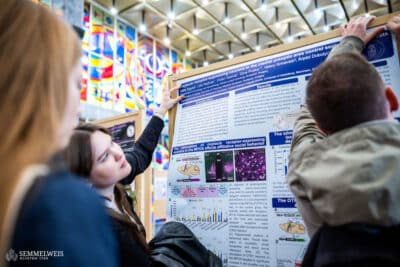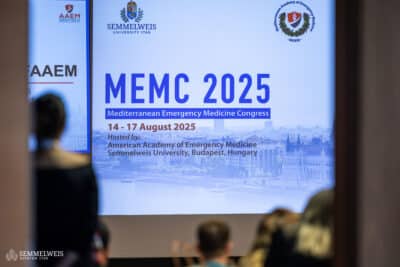The health education program of Semmelweis University (Balassagyarmati Egészségnevelő Program) had the opportunity to present its posters in two sections at the online international event, the 16th World Congress on Public Health. One of the posters was presented in the section of Digital health, health information and communication and the other poster in the section of Health promotion.
The motto of the international public health congress, which was organized between October 12-16, 2020 and was held online this year because of the current epidemiological situation, was Public health for the future of humanity: analysis, advocacy and action. In addition to the broadcasts of one or two plenary sessions per day, the participants had the opportunity to choose from 12 different programs running at the same time. One of the sections was dedicated entirely to presentations and analyses regarding the pandemic, but climate change, the effects of social inequalities on health, challenges caused by non-infectious diseases and opportunities for their solution were also highlighted. The participants had the opportunity to meet leaders of the most important international public health organizations by gaining insight into the personal space of the presenters via the webcam and by chatting with real experts in the Q&A section.
Scientific posters were presented in 24 different topics in a virtual exhibition room from all around the world. The posters prepared by the health education program of Semmelweis University (Balassagyarmati Egészségnevelő Program) were selected for two topics.
The poster selected for the section of Digital health, health information and communication was about the online platform of the health education program. The program’s digital course materials facilitating playful learning serve as supplementation for classroom education. and their extension enabled the continuation of health education during the pandemic. Based on the experiences, the online platform is popular with students, 60-70% of them use it. Furthermore, it seems that students participating in the program’s championship have equal chances to earn awards in the uniformly structured e-learning modules regardless of their school type (secondary grammar school, vocational secondary school).
The other poster, which analyses the educational methodology of the program with the help of a well-known theoretical model, the so-called COM-B model (Capability, Opportunity, Motivation-Behaviour), was selected for the section of Health Promotion. The focus of the analysis was to see which elements of health education make the participants capable (“C”) of making healthy choices, open up new opportunities (“O”) and strengthen the students’ motivation (“M”) for a healthy lifestyle. On the basis of the results, the health education program of Semmelweis University is capable of having an effect in all the three areas and facilitating positive health behaviour. The health education program has the largest influence on psychological abilities: students gain a lot of new knowledge about their health, and they can practice the skill of “saying no”, thinking in long-term consequences and prepare them for conscious decision-making.
The abstracts of the posters were published in the latest issue of the European Journal of Public Health, where they are available in English for free until December 31 (Poster 1, Poster 2).
Dr. Dorottya Árva, Department of Public Health
Featured image: 16th World Congress on Public Health
Translation: Katalin Illés-Romhányi


